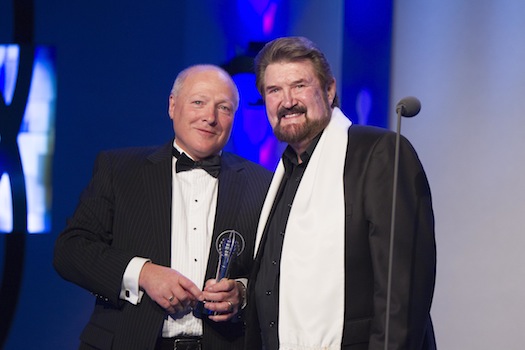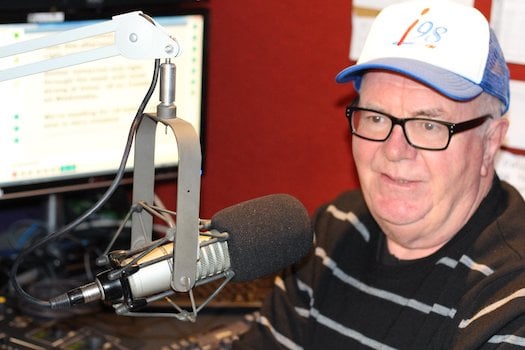Comment from Peter Saxon
It’s one of those “Uh Oh” moments that every radio announcer dreads… that instant when you’ve said something on-air and you can’t believe what you just said. As you watch your career flash before your eyes, you wish you could take it back but you can’t.
That “Uh Oh” moment came with nasty consequences for one of Australia’s most experienced radio journalists, Peter Hand.
 In June last year, on Campbelltown’s C91.3FM in Sydney’s southwest, Hand was on-air, engaging in some witty repartee with Drive hosts Christian McEwan and Annabella Leone (left) about the day’s events. The discussion turned to news that Joe Jackson had been hospitalised when McEwan asked whether they were talking about Michael Jackson’s father Joe or the UK musician with the same name who sang Is She Really Going Out with Him?
In June last year, on Campbelltown’s C91.3FM in Sydney’s southwest, Hand was on-air, engaging in some witty repartee with Drive hosts Christian McEwan and Annabella Leone (left) about the day’s events. The discussion turned to news that Joe Jackson had been hospitalised when McEwan asked whether they were talking about Michael Jackson’s father Joe or the UK musician with the same name who sang Is She Really Going Out with Him?
Interjecting like a know-it-all on trivia night at the pub, Hand chimed in: “Joe Jackson is a pale little fellow and Jackson, the father of Michael, is a great big black bastard.”
Moving right along like, ‘There’s nothing to hear here folks,’ McKewan asked, “But they’re both called Joe, right?”
The veteran newshound knew right away that he couldn’t just move on, so he tried to clarify his position by saying, “When I say bastard I mean he’s a bastard. It’s on the record, he treated his kids badly and that’s what caused Michael’s problems.”
Still kicking himself for what he had said, Hand returned to apologise to listeners, “Anyone who knows me would know that I did not mean it the way it could be taken He was, and it’s fully on the record, that he was a terrible man to his children and in many ways. So, what I said was to highlight that, not to highlight anything else. I am personally upset about what came out – but I apologise.”
Despite his best efforts to make amends for an honest faux pas, Hand was summarily sacked by the station, according to a report on news.com.au: For breaching sections of the Commercial Radio Code of Practice relating to racial discrimination and offensive language, and for failing to “promptly” report the incident to management.
What Hand did report promptly though, was his former employer to The Fair Work Commission for wrongful dismissal. – a case which he won.
A few decades ago, none of this would have happened. Hand would have more likely been reprimanded for using the word “bastard” on-air than “black” in reference to Jackson. And although his conscience may have compelled him to apologise it would hardly have been a sacking offence.
Coincidentally the Jackson family was also the focus of a watershed moment in 2009 that punctuated the quantum shift in social attitudes since the late 20thcentury. During a Hey, Hey It’s Saturday reunion show that was telecast on the Nine Network they brought back the Red Faces segment and some of the most popular performances from the past including six punters doing the same skit they’d done in 1989 called the Jackson Jive. It was a spoof of the Jackson Five singing Can You Feel It. They wore big afro wigs and were all in black face except for the guy playing Michael to highlight the irony that by this time the megastar had pretty much turned himself white.
For most of the huge television audience it was nothing more than an entertaining piece of nostalgia in the great Australian tradition of the ‘send up.’ All was good until one of the guest judges changed the mood completely. It was Harry Connick Jr, a native of New Orleans, who was (still is) not only a world class entertainer but a huge proponent of civil rights having worked closely with black musicians all his life.
There, on live television, Connick Jr was scathing in his criticism of the act telling viewers “If they turned up like that in the United States, it’d be like Hey, Hey There’s No More Show.” He later said that he would not have agreed to be on the show had he known beforehand about the sketch.
That was 2009. In 2019 the chance of a sketch like that getting to air on TV or radio is none or Buckley’s. And, if somehow, it did, there’d be hell to pay. Social media would fire up in seconds and before you knew it, advertisers would be boycotting your station and the ACMA could slap a “condition” on your broadcast licence or even suspend it.
The settlement they were ordered to pay to Hand was almost $30,000 but that’s nothing compared to what it might have cost the station had they done nothing.
In hindsight, though, it seems a bit of an over reaction to fire the man when a suspension and another apology on his return to air would have likely put the incident to bed.
Former Fairfax boss, Graham Mott, considered an expert on compliance matters as they relate to radio, told radioinfo that apart from the ACMA, Peter Hand and the station could have found themselves before the NSW Anti-Discrimination Tribunal as John Laws did in 2004 following comments he made about fashion identity and Queer Eye For The Straight Guy star Carson Kressley at the Melbourne Cup. Laws described Kressley as: a ‘’pillow-biter’’; and a ‘’pansy prig.’’
“The ACMA found that the comments did not breach the Code,” says Mott, “However, the Code has since been toughened up and if it happened today Laws would be in breach. But Laws and 2UE didn’t escape punishment because gay activist Gary Burns referred the matter to the NSW Anti-Discrimination Tribunal which subsequently found that the comments breached Vilification laws.”

Graham Mott is inducted into The Radio Hall of Fame by now Senator, Derryn Hinch
Employment Law is a different kettle of fish altogether
“Employment law works completely separate to other Federal and State laws,” says Mott, “so an action by an employee in a similar circumstance to Hand’s would purely be seen as an employment dispute. The employer would likely have avoided such a claim by suspending the employee instead of terminating them. Management could have re-trained them about the Commercial Radio Code of Practice and asked them to make certain undertakings as part of their continued employment. If they declined, that station would have had legal cause to dismiss him or her on the basis that they refused to follow a reasonable direction.”

Peter Saxon



Good Op Ed piece on Peter Hand. Oh my god, haven’t we all been there? Breaking out in a sweat, cursing ourselves for saying something and wondering what the consequences will be...if any.
One thing I DO know in this case is...I’ve been a friend and colleague of P. Hand for many years and I can safely say he is absolutely not a racist in any form. He’s a good bloke but has a habit of saying stuff he hasn’t thought through before saying it. But, as I say, haven't we all?
When I was learning about radio production, one of the things I learned was to ensure when mikes are supposed to be off air they remain off.
In addition "..be careful what you say on radio..." one has to "..be careful what one says in the studio..." regardless whether the mikes are on or off. There have been situations where the mike has been 'accidentally' left on (or forgotten to be switched off).
Regards
Anthony of exciting Belfield